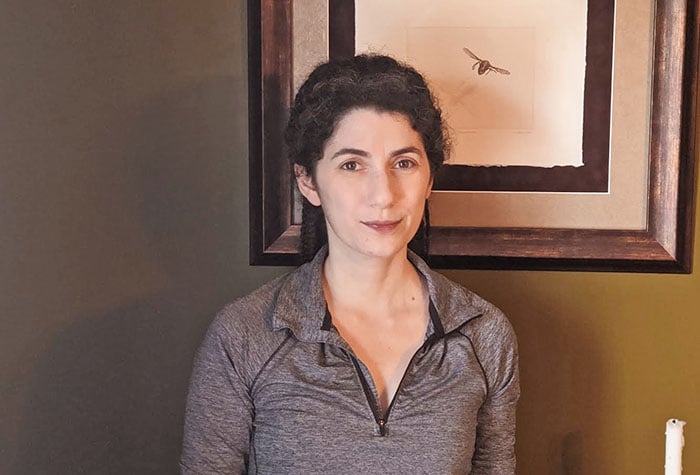 Nina Fefferman has a knack for applying mathematical modeling to biological systems. The more complex, the better. On April 28, she shared some of her research related to COVID-19 at the UT Office of Research and Engagement’s SPARKS event. As a result, she created two new collaborations related to the virus, and one is already working on its first publication.
Nina Fefferman has a knack for applying mathematical modeling to biological systems. The more complex, the better. On April 28, she shared some of her research related to COVID-19 at the UT Office of Research and Engagement’s SPARKS event. As a result, she created two new collaborations related to the virus, and one is already working on its first publication.
The virtual SPARKS event, which stands for “Seeking Partnerships to Advance Research, Knowledge, and Science,” featured 25 lightning talk presenters and 75 participants who gathered via Zoom.
The first presenter was Fefferman, professor and chair of graduate admissions for the Department of Ecology and Evolutionary Biology and director of the Mathematical Modeling Consulting Center at the National Institute for Mathematical and Biological Synthesis (NIMBioS) at UT. She had just received a RAPID grant from the National Science Foundation titled “Modeling the Coupled Social and Epidemiological Networks that Determine the Success of Behavioral Interventions on Limiting Spread of COVID-19.” Her SPARKS presentation focused on three different COVID-19 models about limiting infections in company workforces, schools, and jails, and across communities throughout the US.
“The SPARKS meeting was fantastic. I saw what others were doing, and I learned where to point people when asked by the public or media about COVID-19 research at UT,” Fefferman says. “Plus, two collaborations started that wouldn’t otherwise have happened. I take no credit at all. In each case, the collaborators reached out to me.”
One of those collaborators was Chien-fei Chen, director of education and diversity programs at the NSF-funded Center for Ultra-wide-area Resilient Electric Energy Transmission Networks (CURENT) and research associate professor in the Department of Electrical Engineering and Computer Science and adjunct faculty in the Department of Sociology.
Chen is especially interested in egalitarian issues of justice and energy policy, and the two worked together to build an epidemiological model for the socioeconomic impact of lock-downs and business closures. Their research focused on low, mid, and high-income populations and their access to utilities and healthcare, including the robustness of that access while facing COVID-19.
“Three months later, the fact that I can say we’ve done this research is amazing,” Fefferman says. “We completed the model building and data collection and are already nearing a paper. And the collaboration continues to blossom. It’s not a one-and-done effort. We’re already working on other projects and look forward to more funding in the future.”
Fefferman attributes their early success to frank honesty from the beginning. She says they clicked quickly, despite their different approaches to research. “Both of us were very blunt about our expectations and our interests; luckily they were aligned,” she says.
“As far as COVID research is concerned, everything has been on fire since March. We said, ‘let’s figure it out quickly.’ We wanted to focus on research that would be important to tell people about within six months. This established an important set of questions to answer, to help figure out what to do and what we were capable of. We decided to focus on energy policy and mitigation, partially because no one else was doing it,” Fefferman recalls.
The same SPARKS event resulted in a new project with Shuai Li, assistant professor of civil and environmental engineering, who also has an NSF RAPID grant; this one focused on the impacts of design and operation attributes of infrastructure on pathogen transmission and exposure. Li assembled a team, including Fefferman, to explore using epidemiological models to aid decision-making for smart buildings, with a vision for sensors that will help monitor the risk of disease.
In 2019, Fefferman attended a SPARKS event focused on the Genes to Ecosystems initiative at Oak Ridge National Laboratory, with presenters from ORNL and the three biology departments at UT: Biochemistry and Chemical and Molecular Biology, Ecology and Evolutionary Biology, and Microbiology. While that didn’t result in specific collaborations, she says the event’s speed networking activity expanded her research network.
“SPARKS events are low-energy investments with a rich return on creativity,” Fefferman says. She encourages colleagues to accept a SPARKS invitation whenever possible.
“It’s not the same as being invited to an academic talk, where you usually decide whether to accept an invitation based on the connections that might be of interest. I’ve found that, for SPARKS events, the best connections have been those I wouldn’t have envisioned. It’s easy, it doesn’t take long. I’m also excited for other connections that have been created, but have yet to be followed up on. In the back of my mind, I think that someday I’ll be well rested enough to, literally, spark that new idea,” she says.